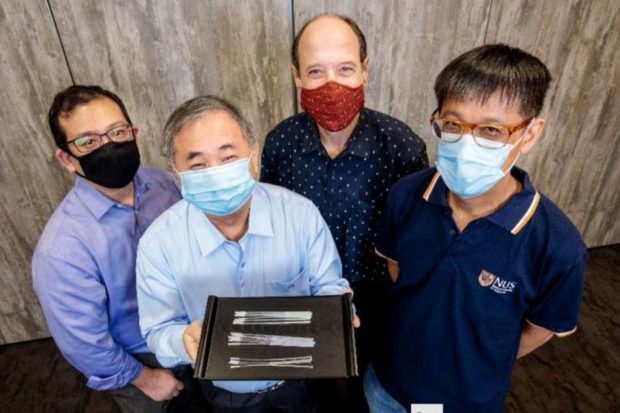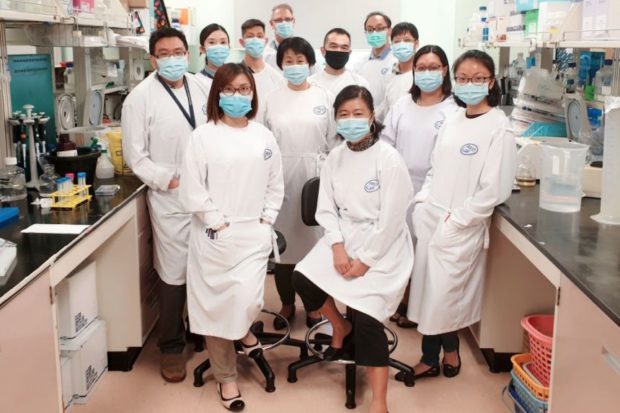Strong science foundation key to Singapore’s COVID-19 efforts

National University of Singapore deputy president (innovation and enterprise) Professor Freddy Boey with the swabs. With him are (from left) Dr Alfred Chia, Associate Professor David Allen and Associate Professor Yen Ching-Chiuan. NATIONAL UNIVERSITY OF SINGAPORE via The Straits Times/Asia News Network
SINGAPORE — Even before Singapore’s first Covid-19 case was reported on Jan 23, the local research community was moving fast to pivot into Covid-19 research, developing a response on all fronts: from manufacturing test swabs to building Singapore’s testing arsenal.
This was possible only because of a strong foundation in science.
Said Professor Low Teck Seng, chief executive of the National Research Foundation: “Our national response to Covid-19 builds on the broad base of scientific capabilities that Singapore has built up over the years.
“For instance, our capabilities in infectious diseases and diagnostic test kits development has supported our national testing and virus surveillance efforts.
“This has enabled the RIE (research, innovation and enterprise) community to swiftly pivot and scale up its response as needed.”
Article continues after this advertisementTo support research efforts, the Ministry of Health and National Research Foundation launched a $45 million Covid-19 research fund under its Research, Innovation and Enterprise plan for 2020.
Article continues after this advertisementThe fund went towards research areas including the modeling of viral transmission, developing novel therapies, and translating research outcomes into products and solutions.
Singapore’s efforts have paid off.
A vaccine is now in the pipeline, and its first shipments expected in the first quarter of next year.
Dubbed the Lunar-Cov19 vaccine, which was co-developed by scientists from the Duke-NUS Medical School and American pharmaceutical company Arcturus Therapeutics, preliminary findings from early stage trials showed positive responses in both safety and immune response.
So far, no serious side effects have been observed, and Phase 3 clinical trials should start this month.
As of end-November, local researchers have contributed more than 1,100 publications to an international pool of knowledge on the Covid-19 virus, with research beginning as early as January.
Duke-NUS announced on Jan 30 that its team of scientists had successfully cultured the virus from an infected patient’s sample, making Singapore the third country in the world outside China to do so.
In February, the first made-in-Singapore diagnostic kit Fortitude, which can detect the Covid-19 virus with high accuracy, was rolled out locally. It is now used at 13 local hospitals and labs, as well as internationally.
Other scientists too, have pivoted from their areas of expertise to develop diagnostic test kits.
Prof Peter Preiser, Associate Vice-President for Biomedical and Life Sciences at the Nanyang Technological University, re-deployed his platform technology, initially used to differentiate between different types of malaria parasites, to flag proteins produced by the Sars-CoV-2 virus. This helped him to develop two test kits: an antigen rapid test and a serology test.
To meet local testing demands, researchers from the National University of Singapore linked up with Temasek Foundation and produced three different swab designs through 3D-printing and injection-moulding.
A total of 7.5 million 3D printed swabs and around 5 million injection-moulded swabs were produced this year. The team is on track to meet the demand for 60 million injection-moulded swabs which they will deliver throughout next year.
Therapeutics research into Covid-19 is also showing promising results. Last Friday (Dec 11), local biotech company Tychan announced it is undergoing its final phase of clinical trials for its antibody, T027, which could help Covid-19 patients recover faster.
Even as work continues at full throttle, more is being planned, going forward.
Part of a $25 billion research, innovation and enterprise plan for the country over the next five years includes investment into a national effort to guard against future threats from infectious diseases.
For more news about the novel coronavirus click here.
What you need to know about Coronavirus.
For more information on COVID-19, call the DOH Hotline: (02) 86517800 local 1149/1150.
The Inquirer Foundation supports our healthcare frontliners and is still accepting cash donations to be deposited at Banco de Oro (BDO) current account #007960018860 or donate through PayMaya using this link.
